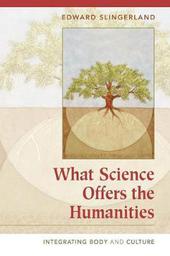
|
What Science Offers the Humanities: Integrating Body and Culture
Paperback / softback
Main Details
| Title |
What Science Offers the Humanities: Integrating Body and Culture
|
| Authors and Contributors |
By (author) Edward Slingerland
|
| Physical Properties |
| Format:Paperback / softback | | Pages:390 | | Dimensions(mm): Height 229,Width 160 |
|
| Category/Genre | Philosophy of science |
|---|
| ISBN/Barcode |
9780521701518
|
| Classifications | Dewey:001.3 |
|---|
| Audience | | Professional & Vocational | | Tertiary Education (US: College) | |
|---|
| Illustrations |
Worked examples or Exercises
|
|
Publishing Details |
| Publisher |
Cambridge University Press
|
| Imprint |
Cambridge University Press
|
| Publication Date |
11 February 2008 |
| Publication Country |
United Kingdom
|
Description
What Science Offers the Humanities examines some of the deep problems facing the study of culture. It focuses on the excesses of postmodernism, but also acknowledges serious problems with postmodernism's harshest critics. In short, Edward Slingerland argues that in order for the humanities to progress, its scholars need to take seriously contributions from the natural sciences - and particular research on human cognition - which demonstrate that any separation of the mind and the body is entirely untenable. The author provides suggestions for how humanists might begin to utilize these scientific discoveries without conceding that science has the last word on morality, religion, art, and literature. Calling into question such deeply entrenched dogmas as the 'blank slate' theory of nature, strong social constructivism, and the ideal of disembodied reason, What Science Offers the Humanities replaces the human-sciences divide with a more integrated approach to the study of culture.
Author Biography
Edward Slingerland taught in the School of Religion and Department of East Asian Languages and Cultures at the University of Southern California, where he was recipient of the 2002 General Education Teaching Award. He is currently Associate Professor of Asian Studies at the University of British Columbia and is Canada Research Chair in Chinese Thought and Embodied Cognition. His previous books include The Annalects of Confucius and Effortless Action: Wu-wei as Conceptual Metaphor and Spiritual Ideal in Early China, which won the American Academy of Religion's 2003 Best First Book in the History of Religions Award.
Reviews"For years humanists have been heralding the end of the great age of Theory. But no one can agree on what comes next. Edward Slingerland knows what comes next: a turn toward science. No one with an interest in where the humanities have recently been, and where they will now be going, can afford to miss out on What Science Offers the Humanities." --Jonathan Gottschall, Washington and Jefferson College "Inquiry into what it means to be human has been hindered by an artificial separation of the humanities and science. Historically, adherence to this separation has been a minority position - one whose intellectual damage Slingerland shrewdly appraises and sets out to repair. This is an intelligent and timely project." - Mark Turner, Case Western Reserve University.
|